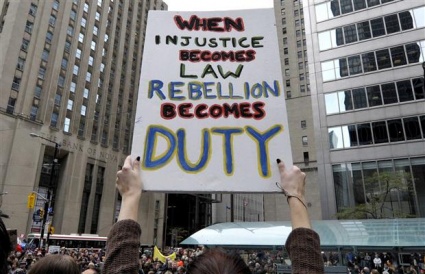October 30, 2011
Occupy movement comes to Canada

As some 2,000 people recently marched from Ryerson University down Church Street, in a steady drizzle, chanting "Occupy Bay Street not Afghanistan," their numbers and their passion indicated their message resonated across a wide spectrum of society.
James Clark, an organizer with the Toronto Coalition to Stop the War and a member of the Steering Committee of Canadian Peace Alliance, said Occupy Wall Street – which led to Occupy Bay Street – was in general a global awakening - another way to continue the Arab Spring.
“The theme is resistance to national militarism. What have we done in the last ten years of war, not just in Afghanistan, but Palestine, Somalia, Iran and Pakistan? As war spread, resistance in the countries targeted and in the home countries has grown. The decade began with the war on terror and ended with the resistance.”
He noted that the message is beginning to reach a new audience because people are losing their jobs and pensions in the economic crisis.
“It's now ordinary people fighting back and the message has reached millions throughout the world. We want money for housing and jobs to improve people's lives. The anti-War Movement is saying, 'Get out of Afghanistan and use the money for these things.”
Meanwhile the march continued down Church Street and east to St. James Park at King and Jarvis Streets, where the protesters chanted “We are the 99 per cent. You are the one per cent” - a global slogan of the Occupy Movement that began on Wall Street and spread around the world.
Douglas Stoute, the dean of St. James cathedral, said the protesters were welcome there and called their concerns legitimate.
“The cathedral has been a place where people meet – and have met for hundreds of years – to express their concerns,” Mr. Stoute said.
Many demonstrators had their own causes, such as elementary school teacher Benjamin Davis protesting for job protection in the wake of budget cuts and the sale of schools and property to private interests by the Toronto District School Board; and June MacDonald, of Fair Vote Canada, demanding proportional representation in our elected assemblies because, “There is frustration because people feel their voices are not being heard.”
But regardless of their grievances, all of them railed against economic and social inequality. The protesters say the system is broken and the wealthiest one per cent gets richer while the rest of society suffers – including the middle class, which includes highly educated and qualified professionals.
After participating in the Occupy Wall Street movement – which she characterized as the ground zero of the economic crisis - Judith Le Blanc, Field Director of Peace Action – the largest peace group in the U.S., with over 100,000 members – said she was compelled to participate in the Occupy Bay Street movement to help express the concerns of people in the communities throughout North America.
“The main purpose is people want to express the hunger and suffering in the communities. Around the world, social movements representing the vast majority are coming to grips with systemic national problems we face every day of our lives.”
She added that the U.S. represents the worst aspects of the system where greed is still good and mega profits are still being made, after a huge infusion of taxpayers' money. When the bailout happened many people lost their homes. While some got very, very rich, the majority are hungry and poor and they face a future filled with uncertainty.
Like many in the occupy movement, Ms. Le Blanc feels that it will have an impact. “The most important thing about Occupy Wall Street is that it's going to strengthen the organizational skills of organizations for economic justice and demilitarization of the U.S. budget. No matter how long the Occupation continues, the political atmosphere in the U.S. has been fundamentally changed.”
While many cite Canada as an example of a country having weathered the economic storm, the gap between rich and poor is growing here as well, with those in the top income bracket paying a smaller percentage of their income in taxes than they did 40 years ago, and social programs constantly being slashed, which may create a need for the new expensive prisons the Harper government insists on building.
Mr. Clark said the movement will continue to grow, as more people gain the confidence to join in. He said that during the march he was surprised to see how many passersby and people looking out of office and apartment windows were clapping, raising their fists and shouting encouragement to the protesters.
“There's no question it’s going to grow and develop. It's already changed the national dialogue dramatically expanding the options on the table. It was just austerity, but we're saying 'No way.' Maybe we'll get rid of capitalism altogether.








